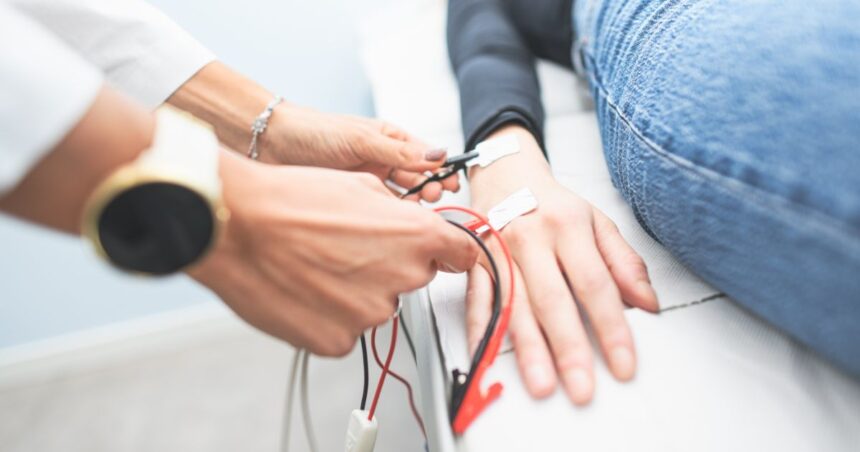Your doctor might suggest a nerve or muscle test if you’ve ever felt strange tingling, numbness, or unexplained muscle weakness. NCV (Nerve Conduction Velocity) and EMG (Electromyography) are tests that help determine what’s happening with your nerves and muscles.
These tests are important for determining neurological issues and finding the best treatment. Let’s look at how NCV and EMG work and how they help doctors diagnose different conditions.
What Is NCV and How Does It Work?
NCV stands for Nerve Conduction Velocity. This test checks how fast electrical signals move through your nerves. During the NCV test, small patches called electrodes are placed on your skin. These electrodes send a mild electric pulse to a nerve.
The test then measures how fast the signal travels through your nerves. The speed of this signal can show whether there is nerve damage and where it is located.
If your nerves are damaged, they won’t send signals as quickly as healthy nerves. This information helps doctors figure out what might be causing symptoms like numbness or tingling.
What Is EMG and How Does It Work?
EMG stands for Electromyography. This test measures the electrical activity in your muscles. During an EMG, a tiny needle electrode is inserted into a muscle. This needle picks up electrical signals from the muscle while it’s resting and moving. These signals help doctors understand how well your muscles are working.
If the muscles are weak or do not get the proper signals from your nerves, it will show up in the results. The EMG helps determine if muscle weakness is caused by problems with the muscle itself or the nerves that control it.
Why Do You Need NCV and EMG Tests?
Doctors use NCV and EMG tests to discover why someone has symptoms like pain, tingling, numbness, or muscle weakness. These tests can help diagnose many conditions, including carpal tunnel syndrome, peripheral neuropathy, muscular dystrophy, and ALS (Amyotrophic Lateral Sclerosis).
When you have symptoms that affect your nerves or muscles, it can be hard to know what is causing them just by looking or asking questions. NCV and EMG give doctors a clearer picture of what’s happening inside your body to make an accurate diagnosis and recommend the best treatment.
What to Expect During an NCV or EMG Test
Getting an NCV or EMG test may sound intimidating, but it’s not as bad as it seems. During an NCV, you will feel a mild, tingly electric pulse, which might feel strange but is not painful. The EMG involves inserting a small needle into your muscle.
This might cause slight discomfort, but it’s generally not very painful. Both tests are done in a medical office and usually take 30 to 60 minutes. After the test, you might feel a bit sore, but no significant recovery time is needed. Knowing what to expect can help you feel more comfortable if you need one of these tests.
How NCV and EMG Help Diagnose Neurological Conditions
NCV and EMG tests are beneficial for diagnosing neurological conditions. If you have a problem with your nerves or muscles, the tests can show whether the issue is with the nerve pathways or the muscles themselves.
For example, if the NCV shows that your nerves are not sending signals properly, it could mean there is damage from a condition like carpal tunnel syndrome or diabetic neuropathy.
If the EMG shows unusual muscle activity, it could point to a muscle disorder or even a problem in the central nervous system. By using both tests, doctors can see how well your nerves and muscles are working.
Benefits of NCV and EMG for Your Health
NCV and EMG tests provide important information that helps doctors create an effective treatment plan. With the results from these tests, doctors can determine whether you need medication, physical therapy, or even surgery. Without these tests, it would be harder to understand the exact cause of nerve or muscle problems, which could delay proper treatment. These tests help to:
- Pinpoint the exact location of nerve or muscle damage
- Determine the severity of the damage
- Guide the best treatment options for your condition
Getting an accurate diagnosis is the first step to improving your quality of life, and NCV and EMG make that possible.
Preparing for Your NCV or EMG Test
If you’re scheduled for an NCV or EMG test, here are a few tips to help you prepare:
- Wear comfortable, loose-fitting clothing so the doctor can place the electrodes or needles easily.
- Avoid using lotions or oils on your skin on the day of the test, as they can make it harder for the electrodes to stick.
- Let your doctor know about any medications you’re taking, as some drugs can affect the results.
Preparing well can make the test go more smoothly and ensure accurate results.
What Happens After an NCV or EMG Test?
After the test, your doctor will review the results and explain what they mean. The results of the NCV and EMG will show if there is any nerve or muscle damage and help pinpoint the cause of your symptoms. Based on the findings, your doctor might recommend further tests, treatment, or lifestyle changes.
Depending on the results, you could be prescribed physical therapy to strengthen your muscles, medication to manage pain, or other treatments. The goal is to use the information from these tests to help you feel better and manage any conditions effectively.
Final Thoughts
NCV and EMG tests are essential for understanding what’s happening with your nerves and muscles. They help doctors diagnose conditions that can cause pain, weakness, and other symptoms. By providing a clear picture of how well your nerves and muscles are working, these tests make it easier for doctors to recommend the right treatment.
If you ever need an NCV or EMG, remember that these tests help you get the care you need to feel your best. Proper diagnosis leads to appropriate treatment, which can make all the difference in improving your quality of life.

